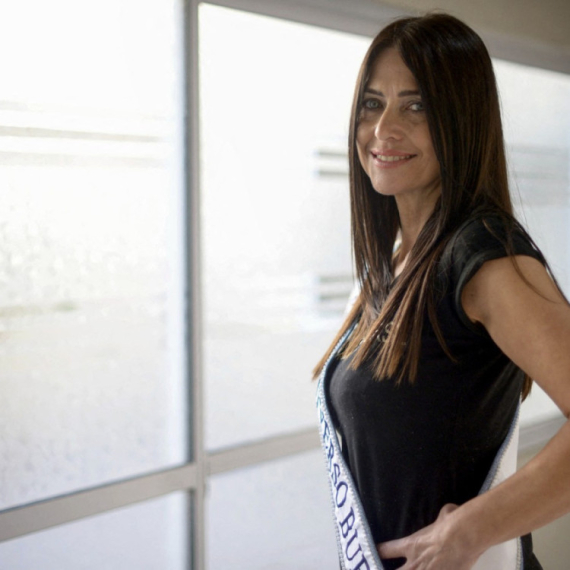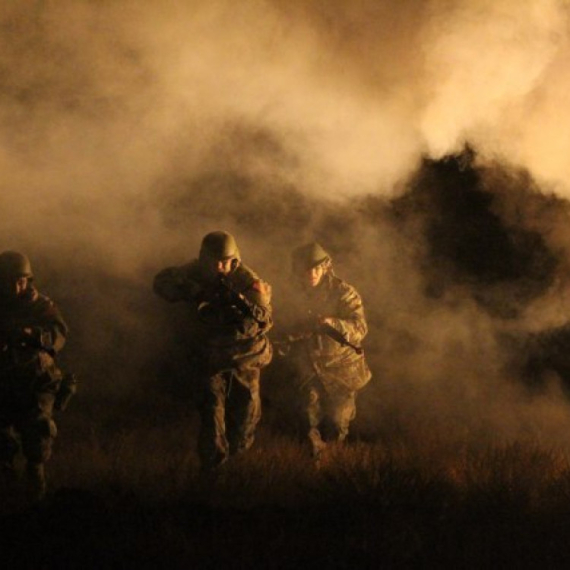Serbia in KSB protest to UN, NATO
Foreign Minister Vuk Jeremić says that President Boris Tadić has sent a letter to the NATO and UN secretary generals regarding the formation of the BSK.
Thursday, 22.01.2009.
09:32

Foreign Minister Vuk Jeremic says that President Boris Tadic has sent a letter to the NATO and UN secretary generals regarding the formation of the BSK. In the letters Tadic sets out his vehement opposition to the formation of the Kosovo Security Forces (BSK). Serbia in KSB protest to UN, NATO Jeremic said that he would be discussing the matter not only in the UN Security Council, but within all international regional security organizations. “Unfortunately, NATO has put the BSK in operation, we have remonstrated vehemently, and our level of relations with NATO is not the same as it was before,“ he added. NATO, meanwhile, claims that the BSK are not an army, but a lightly armed formation that will be used in crisis situations and for mine clearance. A NATO official in Brussels told Beta that the Alliance could not agree with Belgrade’s view that the BSK was an “illegal paramilitary formation“, and that this was why Belgrade would send a protest to the UN. The source in NATO said that the new security forces in Kosovo had still to undergo training, that their recruitment had only just begun, and that they would be under the full civil, democratic control of the parliament in Pristina and a separate ministry. The same source added that KFOR would be training BSK members in line with NATO standards. NATO would help, it was added, in forming that ministry, while the BSK would not be involved in police missions. The forces, which will be multi-ethnic, will number 2,500 members and 800 reservists, and will use two official languages: Albanian and Serbian. An official in EU High Representative Javier Solana’s cabinet told Beta that the creation of the BSK was not an EU matter, but that of the UN and NATO. The official added that it needed to be borne in mind that five EU member states had still to recognize Kosovo. NATO Secretary General Jaap de Hoop Scheffer said that he could “understand that there is dissatisfaction in Belgrade“ over the fact that KFOR had been assigned to train the KSB. Scheffer said that it was “far better for professional forces under democratic control to be responsible for the security issue,“ than for it to be entrusted to a group like the Kosovo Protection Corps. The NATO secretary general said that it would be “very good if the KSB were a truly multi-ethnic formation“ and were represented by a certain number of Kosovo Serbs. He added that the situation in Kosovo was sensitive and complex, and that it was necessary for the problems there to be resolved “step by step“. Vuk Jeremic (FoNet, archive)
Serbia in KSB protest to UN, NATO
Jeremić said that he would be discussing the matter not only in the UN Security Council, but within all international regional security organizations.“Unfortunately, NATO has put the BSK in operation, we have remonstrated vehemently, and our level of relations with NATO is not the same as it was before,“ he added.
NATO, meanwhile, claims that the BSK are not an army, but a lightly armed formation that will be used in crisis situations and for mine clearance.
A NATO official in Brussels told Beta that the Alliance could not agree with Belgrade’s view that the BSK was an “illegal paramilitary formation“, and that this was why Belgrade would send a protest to the UN.
The source in NATO said that the new security forces in Kosovo had still to undergo training, that their recruitment had only just begun, and that they would be under the full civil, democratic control of the parliament in Priština and a separate ministry.
The same source added that KFOR would be training BSK members in line with NATO standards.
NATO would help, it was added, in forming that ministry, while the BSK would not be involved in police missions.
The forces, which will be multi-ethnic, will number 2,500 members and 800 reservists, and will use two official languages: Albanian and Serbian.
An official in EU High Representative Javier Solana’s cabinet told Beta that the creation of the BSK was not an EU matter, but that of the UN and NATO.
The official added that it needed to be borne in mind that five EU member states had still to recognize Kosovo.
NATO Secretary General Jaap de Hoop Scheffer said that he could “understand that there is dissatisfaction in Belgrade“ over the fact that KFOR had been assigned to train the KSB.
Scheffer said that it was “far better for professional forces under democratic control to be responsible for the security issue,“ than for it to be entrusted to a group like the Kosovo Protection Corps.
The NATO secretary general said that it would be “very good if the KSB were a truly multi-ethnic formation“ and were represented by a certain number of Kosovo Serbs.
He added that the situation in Kosovo was sensitive and complex, and that it was necessary for the problems there to be resolved “step by step“.


























































Komentari 22
Pogledaj komentare